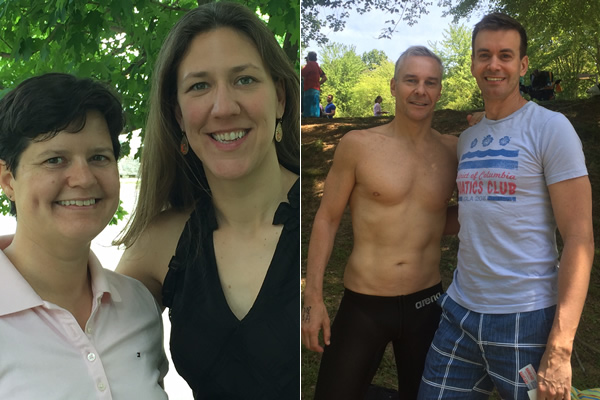Sports
Meet 2 couples sharing their lives and a love of sports
Rowing, swimming offer friendly competition and a common bond


On left, Sheila and Gretchen O’Sullivan are members of the DC Strokes Rowing Club. On right, Fred Dever and Eric Czander met on the DC Aquatics team. (Photos courtesy of the couples)
Many of the LGBT sports teams in D.C. count same-sex couples as members of their clubs. Some joined the team together and others became a couple after first being teammates.
Meet two LGBT couples who have woven sports into the lives they are sharing. Not only are they benefitting their own health and well-being, they are sharing it with their partner.
Sheila O’Sullivan grew up in Novi, Mich., where soccer was her sport of choice. She attended high school in England and added rowing as her spring sport.
Back in the States, she graduated from the Coast Guard Academy in Connecticut in 2000. She coached rowing on Sammamish Lake in Washington before heading to grad school at Carnegie Mellon University.
Canonsburg, Pa. was home to Gretchen O’Sullivan where she played softball and tennis in high school. She attended Allegheny College and was a member of the orchestra. A stint with AmeriCorps was followed by grad school at Carnegie Mellon.
The pair became a couple after meeting at grad school in Pittsburgh. Sheila would graduate first in 2007 and leave to work with the Peace Corps before moving to D.C. in 2009 where she joined the club program of the DC Strokes Rowing Club.
“After she left I joined the learn to row program with Three Rivers Rowing in Pittsburgh,” says Gretchen. “It was all because of Sheila. I never would have thought of rowing otherwise.”
Gretchen came to D.C. the following year and started with the DC Strokes novice program. She eventually joined Sheila in the club program and they often ended up in the same boat.
“She would get frustrated with me, but the overall experience was great,” says Sheila. “It’s great being outside and working as a team. We met our core group of friends with the Strokes and even if we are not rowing, they remain in our lives.”
“She was only trying to help me when we were in a boat together, but it was sometimes stressful,” Gretchen says. “Otherwise it was wonderful and there was great energy. Our drives back and forth to practice were always fun.”
Life started getting in the way for the pair and they began swapping rowing seasons to be supportive of who had the time to row. There was work, a new puppy, a new house, and they got married in the spring of 2013.
Both were competing in regattas – Sheila moved up to the competitive program and rowed at Stonewall, Charm City Sprints and the Head of the Hooch in Tennessee; Gretchen at the 2014 Gay Games in Cleveland where she won medals of each color.
Gretchen was trying to get pregnant in 2015 which meant that it was Sheila’s turn to row again. Their baby was born in late 2016 and Sheila started training for a new job with the Park Police. Gretchen is working as a site coordinator with a national nonprofit. Both are currently not rowing but are itching to get back in the boat.
“I really wanted to stay involved, so I am serving on the DC Strokes board as secretary,” says Gretchen. “Rowing is really for everyone and you can adapt it to your own needs. I would love for her to row again and I also see it for myself on the horizon.”
“I love that it is something you can come back to at any age and I am inspired by rowers that are older,” Sheila says. “Rowing is a passion of mine and it will be a lifetime sport for me.”
Syracuse, N.Y. native Fred Dever grew up competing in swimming and water polo through high school. He was an NCAA Division I swimmer at Marist College for four years and captained in his final year. On the side, he lifeguarded and coached swimming and water polo.
His work in pharmaceutical sales brought him to D.C. in 1995 and he was reluctant to join DC Aquatics Club because he didn’t think a gay team would be serious.
“I joined the team in 2002 and it was great getting back into organized workouts and making new friends,” says Fred. “It’s super rewarding, competitive, and everything you can wish for as a gay athlete.”
Eric Czander started swimming year around at age nine while growing up in Westfield, N.J. He swam for four years as an NCAA Division I athlete at Vanderbilt University. His education continued at Rutgers New Jersey Medical School and Emory University School of Medicine for his Neurology residency.
He signed on for five years in the Navy hoping that the military lifestyle would prevent him from coming out. Before his duty began, he joined masters swimming and helped form a gay team in Atlanta where he came out in 1993. His last two years in the military brought him to D.C. where he joined DC Aquatics in 1998.
Fred and Eric met on the team and have spent the last 16 years sharing their lives with a healthy dose of swimming, triathlons and running.
“It helps with motivation to have someone to go to practice with and just having someone by your side,” says Eric. “It’s nice to be able to bounce things off each other. We are each other’s biggest motivator and biggest critic.”
“I like the way it feels having sports in our lives,” Fred says. “I would be a slacker if it wasn’t for Eric. He is much more driven than I am.”
Fred and Eric are the same age and compete in the same age group in swimming, though not in the same events. They are also of the same ability and purposefully don’t train in the same lane at practice.
“There is a little competitiveness in practice even though we don’t swim the same events,” Eric says. “Never harmful though, always healthy. Both of us have grown and learned from each other.”
“Sometimes I just want my own space, so I can be silly with our other teammates,” adds Fred.
In addition to competitive swimming, Fred and Eric have also completed running marathons and triathlons together. Eric had been competing in them for years before meeting Fred and brought him into the sports.
“My first marathon in D.C. was cancelled and Eric pushed me to run the St. Louis Marathon,” says Fred. “We always make sure the other one is safe in our races. Someone died in a recent open water race we were in and I ended up in the medical tent at the Boston Marathon. Each race starts with “I love you, be safe.”’
“When he started doing road running and triathlons, I was beating him at first and then he started beating me,” says Eric. “We try not to race next to each other, but our times are very similar. It’s good motivation.”
Coming up for the pair is a trip to Paris for Gay Games X in August where they both will be swimming eight events in the pool.
“Swimming is all about family and connections,” Fred says. “Our DC Aquatics teammates are our family.”
“It’s awesome to explore new cities and cultures together,” Eric says. “Plus, I can’t wait for Fred to butcher the French language.”
Sports
US wins Olympic gold medal in women’s hockey
Team captain Hilary Knight proposed to girlfriend on Wednesday

The U.S. women’s hockey team on Thursday won a gold medal at the Milan Cortina Winter Olympics.
Team USA defeated Canada 2-1 in overtime. The game took place a day after Team USA captain Hilary Knight proposed to her girlfriend, Brittany Bowe, an Olympic speed skater.
Cayla Barnes and Alex Carpenter — Knight’s teammates — are also LGBTQ. They are among the more than 40 openly LGBTQ athletes who are competing in the games.
The Olympics will end on Sunday.
Sports
Attitude! French ice dancers nail ‘Vogue’ routine
Cizeron and Fournier Beaudry strike a pose in memorable Olympics performance

Madonna’s presence is being felt at the Olympic Games in Italy.
Guillaume Cizeron and his rhythm ice dancing partner Laurence Fournier Beaudry of France performed a flawless skate to Madonna’s “Vogue” and “Rescue Me” on Monday.
The duo scored an impressive 90.18 for their effort, the best score of the night.
“We’ve been working hard the whole season to get over 90, so it was nice to see the score on the screen,” Fournier Beaudry told Olympics.com. “But first of all, just coming out off the ice, we were very happy about what we delivered and the pleasure we had out there. With the energy of the crowd, it was really amazing.”
Watch the routine on YouTube here.
Italy
Olympics Pride House ‘really important for the community’
Italy lags behind other European countries in terms of LGBTQ rights

The four Italian advocacy groups behind the Milan Cortina Winter Olympics’ Pride House hope to use the games to highlight the lack of LGBTQ rights in their country.
Arcigay, CIG Arcigay Milano, Milano Pride, and Pride Sport Milano organized the Pride House that is located in Milan’s MEET Digital Culture Center. The Washington Blade on Feb. 5 interviewed Pride House Project Manager Joseph Naklé.
Naklé in 2020 founded Peacox Basket Milano, Italy’s only LGBTQ basketball team. He also carried the Olympic torch through Milan shortly before he spoke with the Blade. (“Heated Rivalry” stars Hudson Williams and Connor Storrie last month participated in the torch relay in Feltre, a town in Italy’s Veneto region.)
Naklé said the promotion of LGBTQ rights in Italy is “actually our main objective.”
ILGA-Europe in its Rainbow Map 2025 notes same-sex couples lack full marriage rights in Italy, and the country’s hate crimes law does not include sexual orientation or gender identity. Italy does ban discrimination based on sexual orientation in employment, but the country’s nondiscrimination laws do not include gender identity.
ILGA-Europe has made the following recommendations “in order to improve the legal and policy situation of LGBTI people in Italy.”
• Marriage equality for same-sex couples
• Depathologization of trans identities
• Automatic co-parent recognition available for all couples
“We are not really known to be the most openly LGBT-friendly country,” Naklé told the Blade. “That’s why it (Pride House) was really important for the community.”
“We want to use the Olympic games — because there is a big media attention — and we want to use this media attention to raise the voice,” he added.

Naklé noted Pride House will host “talks and roundtables every night” during the games that will focus on a variety of topics that include transgender and nonbinary people in sports and AI. Another will focus on what Naklé described to the Blade as “the importance of political movements now to fight for our rights, especially in places such as Italy or the U.S. where we are going backwards, and not forwards.”
Seven LGBTQ Olympians — Italian swimmer Alex Di Giorgio, Canadian ice dancers Paul Poirier and Kaitlyn Weaver, Canadian figure skater Eric Radford, Spanish figure skater Javier Raya, Scottish ice dancer Lewis Gibson, and Irish field hockey and cricket player Nikki Symmons — are scheduled to participate in Pride House’s Out and Proud event on Feb. 14.
Pride House Los Angeles – West Hollywood representatives are expected to speak at Pride House on Feb. 21.
The event will include a screening of Mariano Furlani’s documentary about Pride House and LGBTQ inclusion in sports. The MiX International LGBTQ+ Film and Queer Culture Festival will screen later this year in Milan. Pride House Los Angeles – West Hollywood is also planning to show the film during the 2028 Summer Olympics.
Naklé also noted Pride House has launched an initiative that allows LGBTQ sports teams to partner with teams whose members are either migrants from African and Islamic countries or people with disabilities.
“The objective is to show that sports is the bridge between these communities,” he said.
Bisexual US skier wins gold
Naklé spoke with the Blade a day before the games opened. The Milan Cortina Winter Olympics will close on Feb. 22.
More than 40 openly LGBTQ athletes are competing in the games.
Breezy Johnson, an American alpine skier who identifies as bisexual, on Sunday won a gold medal in the women’s downhill. Amber Glenn, who identifies as bisexual and pansexual, on the same day helped the U.S. win a gold medal in team figure skating.
Glenn said she received threats on social media after she told reporters during a pre-Olympics press conference that LGBTQ Americans are having a “hard time” with the Trump-Vance administration in the White House. The Associated Press notes Glenn wore a Pride pin on her jacket during Sunday’s medal ceremony.
“I was disappointed because I’ve never had so many people wish me harm before, just for being me and speaking about being decent — human rights and decency,” said Glenn, according to the AP. “So that was really disappointing, and I do think it kind of lowered that excitement for this.”
-

 Baltimore4 days ago
Baltimore4 days ago‘Heated Rivalry’ fandom exposes LGBTQ divide in Baltimore
-

 Real Estate4 days ago
Real Estate4 days agoHome is where the heart is
-

 District of Columbia4 days ago
District of Columbia4 days agoDeon Jones speaks about D.C. Department of Corrections bias lawsuit settlement
-

 European Union4 days ago
European Union4 days agoEuropean Parliament resolution backs ‘full recognition of trans women as women’




















